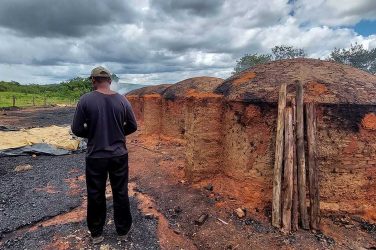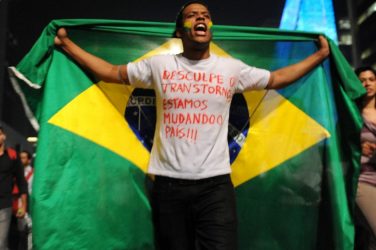In Brazil, every 15 seconds, a woman suffers violence in the home. Yet, Brazil is the only Latin American country that does not have a specific law regarding domestic violence.
A study prepared by the Perseu Abramo Foundation in 2003 indicates that 2.1 million Brazilian women suffer from domestic violence (beatings, spankings, physical torture, rape) each year.
Seventy percent of the aggressors in these cases are husbands or boyfriends of the victims. A woman is much safer on the street than in her own home.
The current Brazilian decree (9.099/95) that deals with domestic violence also covers other civil and criminal acts that are considered of “less gravity”.
These crimes are handled by special criminal judgeships set up in the country and the focus is on reconciliation of the parties involved.
Domestic violence is treated as a “minor potential offense” and the violence is classified as “light” if it results in serious consequences for the victim for up to 20 days (hospitalization, inability to work, etc.).
The victim is then pressured by negotiators to reconcile with the aggressor so that the process can be quickly closed.
Many women arrive at these hearings without any legal advocate or information. Even if a woman does go forward with the process, very few cases result in a fair judgment.
The aggressors who are punished usually pay a small fine or do some community service work. This sense of impunity contributes to the increased growth in domestic violence in the country.
One of the few cases that did go to court and was prosecuted still is held up in the court system. It is the case of Maria da Penha, whose ex-husband tried to kill her after years of battering her and their children.
As a result of the homicide attempt, Maria da Penha is today a paraplegic (irreversible) and, because of serious other wounds from the violence, has very poor health.
Even though her ex-husband was condemned two times in a jury trial and given a sentence of 10 years and 6 months in prison, the case is paralyzed in the Justice Tribunal in the state of Ceará, awaiting the appeal process.
This case resulted in international attention and was brought to the OAS (Organization of American States) in 2001 where Brazil was strongly condemned for negligence and omission in the area of domestic violence. Yet, Maria da Penha’s ex-husband continues to be free.
Maria wrote a book, “Survived, I Can Tell”, in which she denounces the impunity and the slowness of the justice system, that after 20 years, still has not effectively processed this case.
According to Amnesty International, one billion women, or 1/3 of the women in the world, have suffered physical or sexual violence or some other type of abuse.
The Latin American and Caribbean Committee for the Defense of Women’s Rights (CLADEM) indicates that for every five days that women are absent from work, one of those days missed is due to the violence in their own homes.
A woman abused by domestic violence loses one year of healthy life for every five years of her life. In Latin America, domestic violence lowers the Gross Domestic Product by 14.6%, or US$ 170 billion.
Proposal for a New Law Related to Domestic Violence:
For years, social movements, human rights organizations, and women’s groups have been calling for a specific law dealing with domestic violence.
Groups like the São Paulo Forum Against Violence and others throughout the country have made various proposals.
A new bill being discussed proposes that domestic violence against women be defined as any action or conduct based in gender relations that causes death, damage, or physical, sexual or psychological suffering.
It determines that domestic violence cases will be judged in courts that will be established to deal with Domestic and Family Violence Against Women.
The proposed law stipulates that women have the right to services in the health system and that public policies should stipulate integrated actions to prevent and eradicate domestic violence against women.
It also determines that women in these situations should have easy and efficient access to the police, professionals trained to deal with domestic violence, and the free services of a public defender.
This proposed law is one step to combat the problem of domestic violence; however, the issue of protection for women who denounce domestic violence as well as impunity for the aggressors still remain to be resolved.
SEJUP – Brazilian Service of Justice and Peace – www.sejup.org











